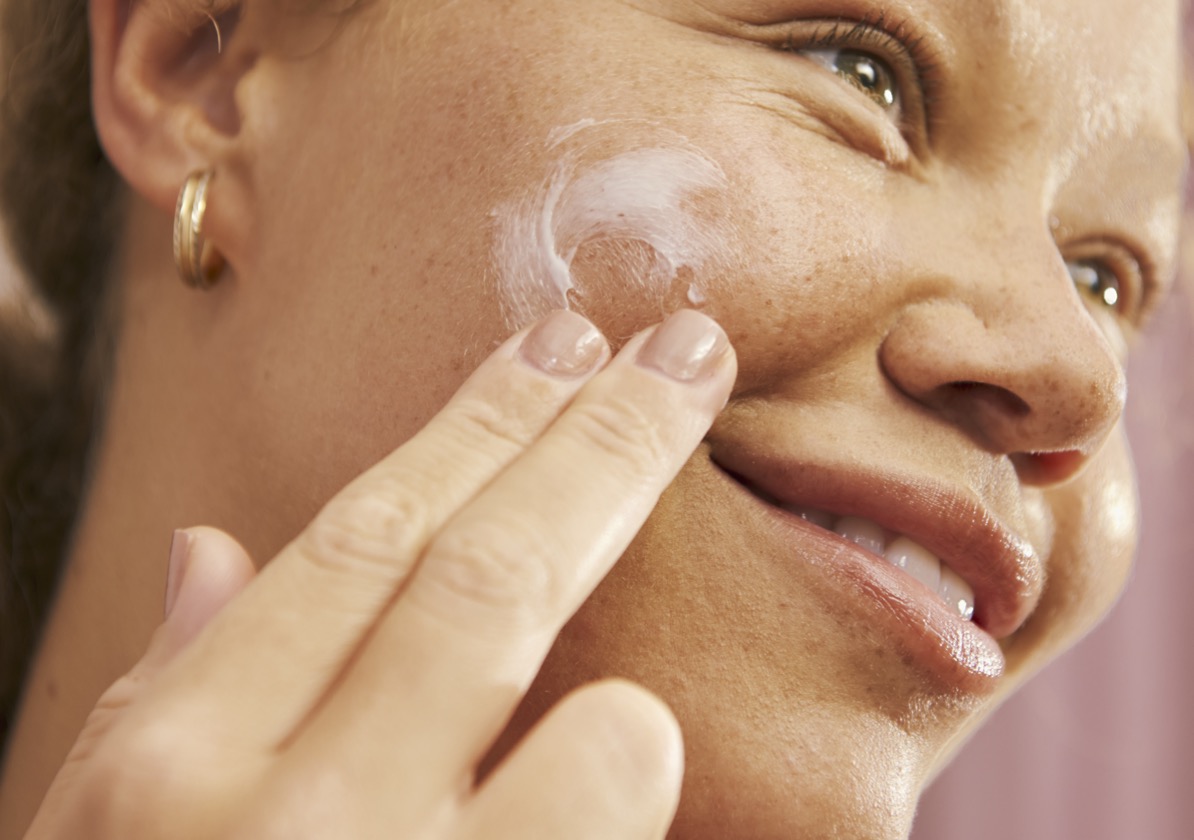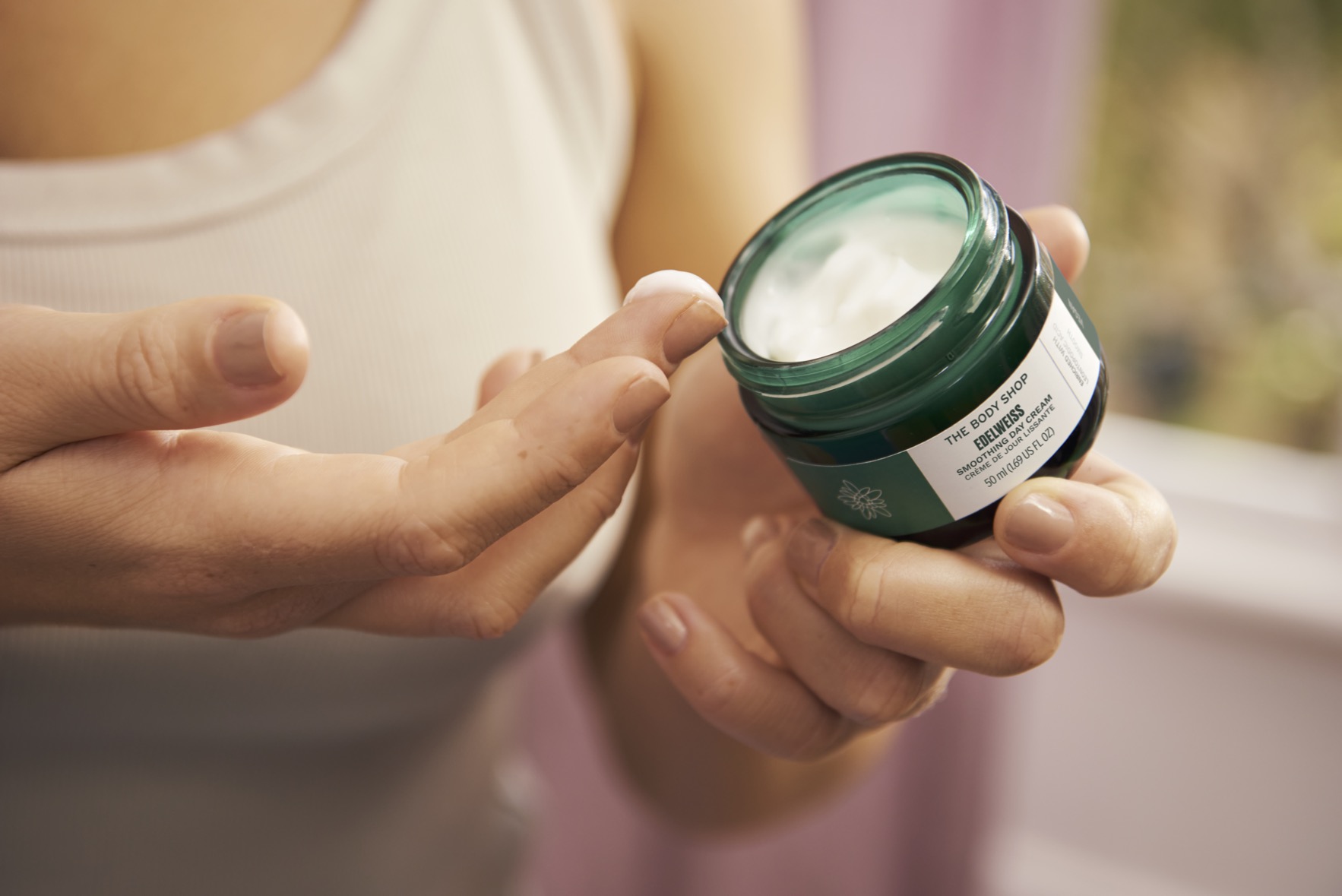“Getting old is f**king hot,” Julia Fox declared on TikTok. The actress and model took to social media this week in a multi-video rant to reverse the damaging stigma around ageing, “We deny ourselves these milestones, and for what?” It’s the very subject Dr. Alia Ahmed has dedicated her career to and specialising in psychodermatology addresses the interaction between mental health, anti-ageing, and our skin.
In 2021, The Body Shop found 43 percent of survey participants felt that the beauty industry negatively impacts their self-esteem, thus directly impacting our mental health. As Fox so eloquently puts it, “If I see another product that says ‘anti ageing’ on the label, I’m suing. I’m going to sue because I’m going to age regardless.”

In response to the findings the global brand made a drastic decision to change their best-selling range ‘Drops of Youth’ to the renamed, and reformulated ‘Edelweiss’– the flower in which the products use – in a bid to fight the negative rhetoric. While the anti-aging industry accounts for $140 billion annually, according to Globe News Wire, The Body Shop’s commitment is a notable example in reforming the industry for the good of our mental health and skin.
While Edelweiss is known to help boost the skin’s defence mechanism and barrier function, Dr. Ahmed suggests holistic ways in which we can boost the appearance of healthy skin, hair and nails.
GRAZIA: Firstly, what inspired you or interested you about the practice of psychodermatology?
Dr. Alia Ahmed: “There’s a strong history of both hair and skin conditions in my family. When I was growing up, I noticed how much they impacted those around me. Someone in my family suffered from bad acne for example. There was a myth going around at the time that drinking copious amounts of water at bedtime would be the cure all. Needless to say, they were up and down all night going to the loo.
“My mum also got rosacea after her dad died. She’d never had any problems before; it was just the stress of the bereavement expressing in her skin. So that’s why I got into it; I could see that there was such a strong link between what was happening inside your mind and what you could see on your skin.”
What does a day look like in your line of work?
AA: “On a typical day I will see a mix of patients, young and old, acne to skin cancer to hair loss! What is most exciting is that each journey is unique, and I get to be a part of it. I enjoy discussing different ways to manage their issues with my patients, incorporating their lifestyle choices into treatment plans. Days can be tough as there is a lot of management of emotional health as well as physical symptoms.”
How has social media changed our relationship with our skin?
AA: “It continues to surprise me how much influence social media has on perception of skin. I have seen many patients who do not have even one unfiltered image of themselves, it truly saddens me. All skin is normal and beautiful, but the expectations driven by social media have distorted reality for many people. Having constant comparators is exhausting for any person. Being, looking and feeling better has become an unhealthy obsession. Accepting the skin we are in and showing ourselves some kindness would go a long way! On the other end of the spectrum, there is a growing movement of skin positivity that has allowed many people to embrace their natural skin.”
Talk to me about how stress and anxiety affects our skin.
AA: “Too much and the wrong kind of stress can be harmful to our bodies as well as our skin. It can lead to skin allergies as it activates what are known as mast cells.
“When your body releases cortisol it alters how you produce collagen and what are known as proteoglycans, which are the building blocks of skin. This can lead to loss of elasticity and firmness in your skin. Stress-induced cortisol production can also reduce the amount of hyaluronic acid, a natural acid in the body and skin, which helps us to retain water. Finally, cortisol can increase the production of oil in some people, which can contribute to acne breakouts.”
“Managing stress and the sources of stress is an often-overlooked part of ensuring that our skin is taken care of.”

Does this apply to parts of our body like hair and nails?
AA: “Stress can affect any organ. There is well documented evidence of the effect of physical and emotional stress on the hair follicle, causing premature shedding (otherwise known as telogen effluvium). Similarly nails can be affected by stress by disrupting growth and absorption of essential nutrients for nail health. The building blocks for skin, hair and nails are the same, and can be damaged by stress.”
Can you see a difference in the skin between people who struggles with mental than someone who does not?
AA: “Skin is very individual so we cannot generalise that people without mental health issues will have less skin issues. What we know from research is that people with skin conditions are more likely to experience poor mental health and have a higher incidence of psychiatric impact (like anxiety and depression). I do see a lot of skin issues that have been triggered or made worse by stress, this includes conditions like psoriasis, eczema and rosacea (to name a few).”
What are some daily practices to ensure we’re giving our skin the best chance at repair?
1. Create environments that build positivity using warming scents, uplifting music and comforting colours.
2. Finding moments of joy in routines. An easy example is incorporate a face massage into your daily skincare routine, or applying a mask once a week – I love The Body Shop’s Edelweiss Sheet mask for a quick boost and it helps my skin feel instantly smoother.
3. Working on positive self-dialogue and fostering gratitude in your daily life.
4. Incorporating realistic changes into your day that will improve your skin health. Restorative sleep routines, mindfulness, hydration – l love applying The Body Shop’s Edelweiss Bouncy Sleeping Mask before bed for a soothing feeling before I head off, and so I always wake up with my skin feeling re-energised.
What do you tell a client who fears the natural process of ageing?
AA: “Skin is on a journey and will inevitably show the signs of that. Just because it is on the ‘outside’ and visible does not mean that is something to be ashamed of. Ageing is a natural process that we all go through. Fear is also natural, and if this is related to skin then consider adopting techniques to care for and protect your skin. Some simple choices are – wear high factor sunscreen daily, incorporate antioxidants into skincare regimes, optimise sleep, prioritise fluid intake and make healthy choices for your body, avoid smoking and move more.”
Tile credit: MARCO BERTORELLO/AFP via Getty Images








